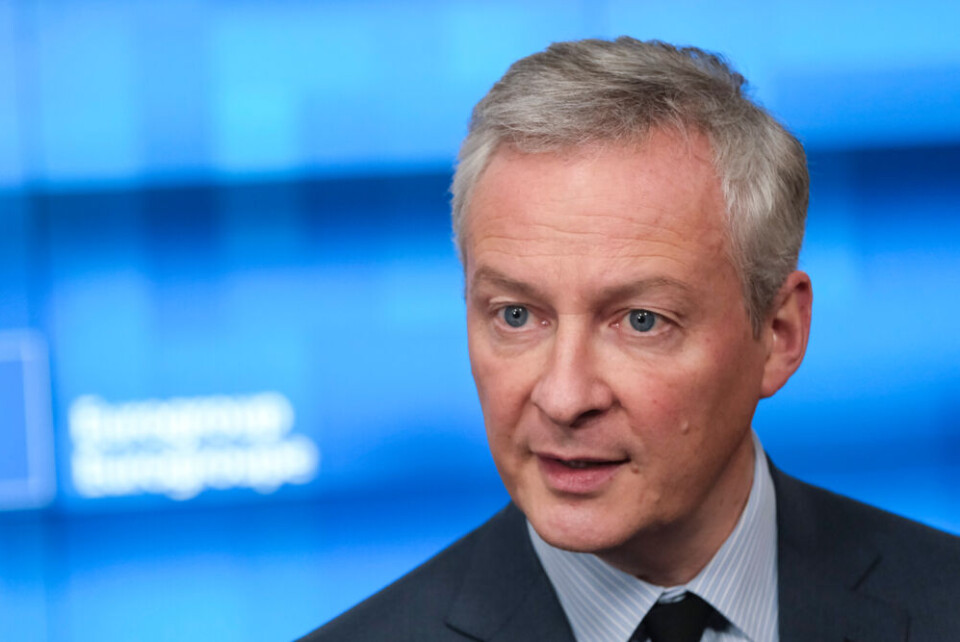-
Pension age reform in France: Most favour return to age 62
A ‘conclave’ of employers' organisations and trade unions is meeting to discuss matter on the the orders of Prime Minister François Bayrou
-
Mystery of jewels found buried under communal wall in Dordogne
The gold rings, pearl brooches and diamond encrusted bracelets were discovered by a local association
-
Try a different way to cross UK-France the Channel - a sailing catamaran ferry
Passengers will be able to help sail the boat once out of the harbour
French energy bill cap will not cause 2023 price rise, says minister
It had been reported that household bills would rise by up to 8% to help repay suppliers for the money lost while maintaining the freeze

People in France will not be affected by energy tariff increases designed to reimburse suppliers for what they have spent this year to maintain the national price freeze, the government has insisted.
“I want to be very clear: consumers in France will not see any adjustment [relating to the current tariff cap] to their bills in 2023,” Finance Minister Bruno Le Maire said during a press conference yesterday (May 30).
“We made a promise and we will keep it.
“In 2023, we want to continue to protect people in France against the increasing cost of electricity and gas,” he added, but did not give any further details on the measures envisaged by the government.
Mr Le Maire said that these measures will be included in the state’s next budget, called the Loi de finances, which is set out every autumn.
This comes after a report was published yesterday (May 30) in Le Parisien, stating that tariffs would increase by up to 8% in 2023 in order to compensate electricity and gas suppliers for a year spent selling energy for less than they paid to buy it, in order to ensure that customers benefited from the state’s bouclier tarifaire.
Read more:French energy tariff freeze: public may face rises of 8% next year
This bouclier tarifaire (shield against tariff increases) was introduced in September 2021 and will stay in place until the end of this year. So far, it has meant that electricity rates have been capped at a 4% rise – rather than 44.5% – and regulated gas tariffs have been frozen rather than increasing by 60%, Mr Le Maire said.
Mr Le Maire had already stated on January 14: “There will be no tariff ‘catch up’ causing a new price rise in 2023. It will be the state and EDF who will absorb the cost of this measure.”
However, a recent review from the independent energy authority Commission de régulation de l’énergie (CRE) states that additional funding will be required to pay for the price caps, and fears were raised that consumers would have to shoulder some of the cost.
This was met with criticism from opposition parties, with Marine Le Pen of the far-right Rassemblement National tweeting: “An 8% rise in electricity prices is indeed planned by the government. I had warned the French people that Emmanuel Macron was lying to them and would increase their bills after the elections.
“It will be the same for gas and fuel. Only RN MPs will protect you from this racket.”
Une hausse de 8% de l’électricité est bien prévue par le gouvernement. J’avais prévenu les Français qu’Emmanuel Macron leur mentait et augmenterait leur facture après les élections. Ce sera pareil pour le gaz et le carburant.
— Marine Le Pen (@MLP_officiel) May 30, 2022
Seuls les députés RN vous protègeront de ce racket. https://t.co/50jBYlmOtk
Avant l’élection présidentielle, le gouvernement nous assurait qu’il n’y aurait pas de rattrapage après le bouclier tarifaire.
— Xavier Bertrand (@xavierbertrand) May 30, 2022
En 2023, la facture d’électricité des Français augmentera de 8% selon la @CRE_energie. https://t.co/yPfn4Zquts
During yesterday’s press conference, Mr Le Maire said: “We are in an election period and some people seize the smallest opportunity to create doubts and worries in the minds of our compatriots. I am here to reassure them.
“A commitment was made by the government to freeze gas prices and cap electricity prices. This commitment will be fulfilled.”
France’s legislative elections, in which the country’s MPs are elected, will be held on June 12 and 19.
So far, the bouclier tarifaire is estimated to have cost the state approximately €8billion to cap electricity prices and €6.5billion for gas.
Electricity and gas prices have been increasing over a longer period of time than the government anticipated, as the war in Ukraine contributes to instability on the global market.
Mr Le Maire said that it would cost the state a further €2billion to make sure that consumers were not impacted negatively by the need to reimburse suppliers for their boucliers tarifaires next year.
Related articles
France should ‘no longer need Russian gas within three to four years’
How to heat your home through France’s district heating network
EDF to sell more cheap electricity to competitors to keep prices low
























